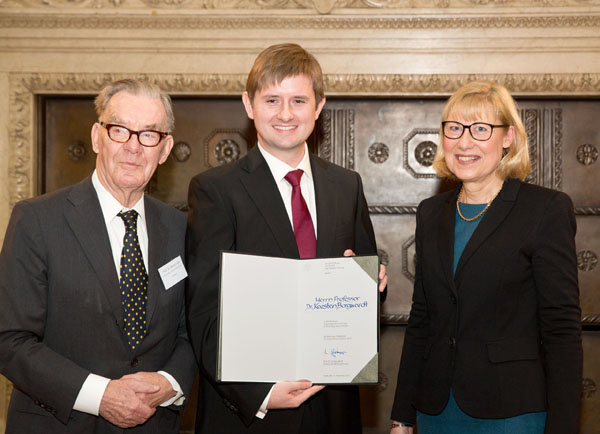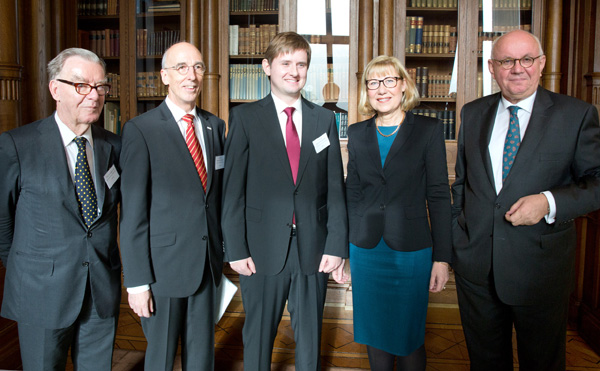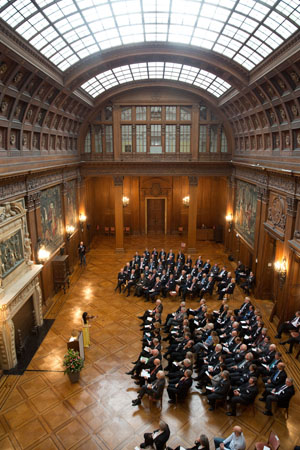Krupp Award 2013

Karsten Borgwardt was awarded the 2013 Alfried Krupp Prize for Young Professors on November 13th, 2013, in Essen, Germany. The Alfried Krupp von Bohlen und Halbach-Stiftung's Board of Trustees selected him unanimously from a shortlist of a further 52 nominees from German universities and research institutes.
"It is a great honour for me to receive this prestigious award," says Karsten Borgwardt. "The generous €1 million prize gives me the opportunity to create new postdoc and PhD positions in my lab, and to tackle new research questions at the interface of computer science and biomedicine," adds the scientist.
Only thirty-two years old, Karsten Borgwardt teaches computer science at the University of Tübingen and in parallel runs a joint research group of the Max Planck Institutes for Intelligent Systems and Developmental Biology, both in Tübingen, Germany. Karsten Borgwardt studied computer science at the University of Munich from 1999 to 2004 and completed a Master course in biology at the University of Oxford in 2002/03. He focuses on data mining in the life sciences, thus bridging the gap between these two scientific disciplines. "Data mining" refers to the computeraided search for patterns in large datasets, a research field that could yield new insights into the structure of data systems.
Especially in medicine and biology, research has increasingly focussed on data mining for a number of years. For instance, scientists have been trying to discover mutations in the genome sequences of thousands of individuals, a fact that often occurs in parallel with hereditary diseases or intolerance for a particular medical drug. Data mining researchers also strive to understand which of the millions of possible partial structures of a protein elicit a particular function, such as a medical effect.
All these topics have one thing in common for computer scientists: they involve finding the optimum solution from thousands, millions or even billions of candidate solutions, such as the variation in the genome sequence that occurs the most frequently in patients with a positive course of therapy. This means being able to calculate how good a solution is and rapidly decide which is the best one.

Data analysis in the life sciences thus requires the development of new, extremely rapid algorithms to search for, assess and compare possible solutions. Karsten Borgwardt has come up with new algorithms for comparing information included in the human genome, a complete set of DNA. He authored over fifty papers on this subject for leading journals and conferences, from theoretical genetics to computer science. He is particularly well known for his work on the efficient comparison of graphs, which helps to discover disease-related molecular networks and for which he has received two awards.
Borgwardt's research activities and the algorithms he has developed could play a key role in gaining new insights into the molecular structure of diseases. Several international genetics consortia have already used his work for this purpose. Ultimately, it takes us one step closer towards "personalized medicine", namely the individualisation of medical treatment in such a way asto take the molecular properties of each patient into account. The award committee also stressed that his findings may provide "new insights into the molecular structure of disease" and the predictability of drug responses.

The prize ceremony was held at the Villa Hügel in Essen, with numerous guests from science, politics, and society. Karsten Borgwardt received the Krupp Prize from Reimar Lüst, the head of the scientific advisory board of the foundation, and Ursula Gather, the head of the Board of Trustees of the foundation. The laudatory speech was given by Wolfgang Rosenstiel, dean of the faculy of Science at the University of Tübingen. Rosenstiel summarized Borgwardt's biography, and named him "one of the most promising young scientists in Germany". After the the laureate's speech, Peter Strohschneider, president of the German Research Society, DFG, gave a lecture on scientific education. Before the prize ceromony, PhD students and postdocs of Borgwardt's lab had the opportunity to discuss with former prize laureates.
All photos (c) Alfried Krupp von Bohlen und Halbach-Stiftung, P. Wieler and B. Kraemer
News articles
- external page Press release of the Alfried Krupp von Bohlen und Halbach-Stiftung (in German)
- external page Press release about the prize ceremony (in German)
- external page News alert of the Research Executive Agency (REA)
- external page Article in Südwest Presse (in German)
- external page Article in Focus (in German)
- external page Article in Kölnische Rundschau (in German)
- external page Article in Ärzteblatt (in German)
- external page Article in Augsburger Allgemeine (in German)
- external page Article in Schwäbische (in German)